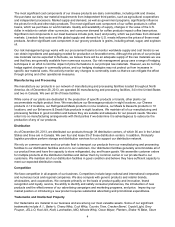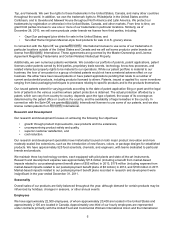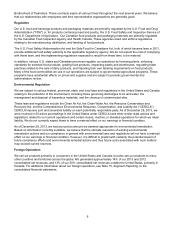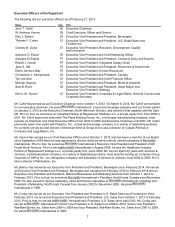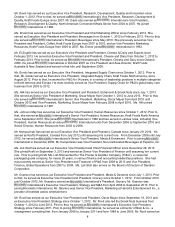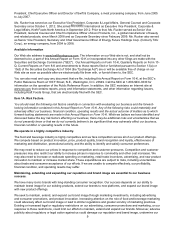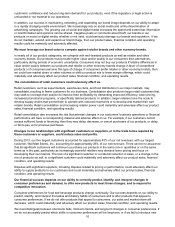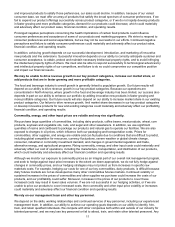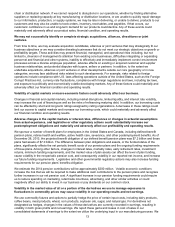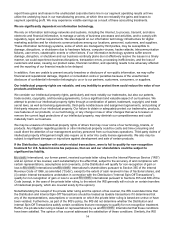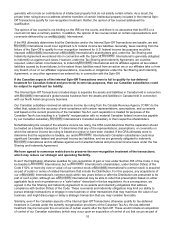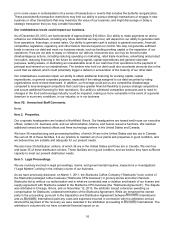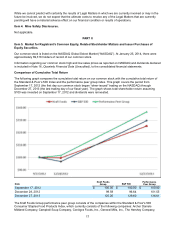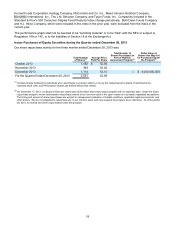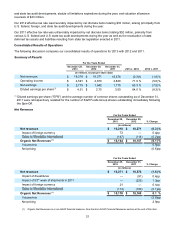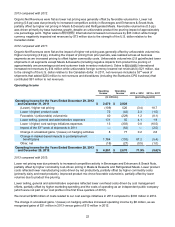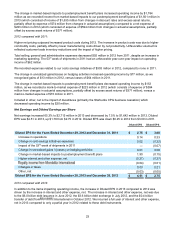Kraft 2013 Annual Report Download - page 16
Download and view the complete annual report
Please find page 16 of the 2013 Kraft annual report below. You can navigate through the pages in the report by either clicking on the pages listed below, or by using the keyword search tool below to find specific information within the annual report.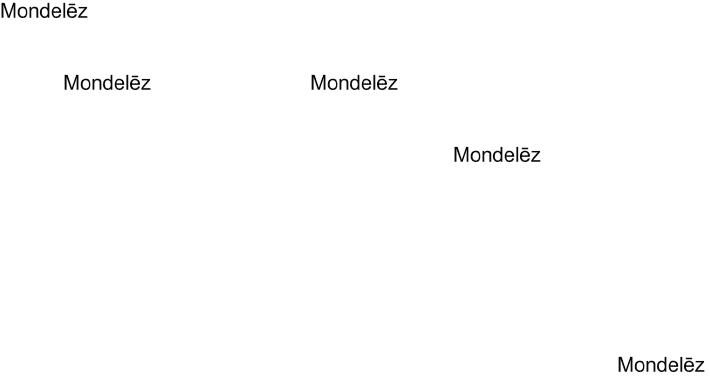
14
report these gains and losses in the unallocated corporate items line in our segment operating results until we
utilize the underlying input in our manufacturing process, at which time we reclassify the gains and losses to
segment operating profit. We may experience volatile earnings as a result of these accounting treatments.
We are significantly dependent on information technology.
We rely on information technology networks and systems, including the Internet, to process, transmit, and store
electronic and financial information, to manage a variety of business processes and activities, and to comply with
regulatory, legal, and tax requirements. We also depend on our information technology infrastructure for digital
marketing activities and for electronic communications among our locations, personnel, customers, and suppliers.
These information technology systems, some of which are managed by third parties, may be susceptible to
damage, disruptions, or shutdowns due to hardware failures, computer viruses, hacker attacks, telecommunication
failures, user errors, catastrophic events or other factors. If our information technology systems suffer severe
damage, disruption, or shutdown and our business continuity plans do not effectively resolve the issues in a timely
manner, we could experience business disruptions, transaction errors, processing inefficiencies, and the loss of
customers and sales, causing our product sales, financial condition, and operating results to be adversely affected
and the reporting of our financial results to be delayed.
In addition, if we are unable to prevent security breaches or disclosure of non-public information, we may suffer
financial and reputational damage, litigation or remediation costs or penalties because of the unauthorized
disclosure of confidential information belonging to us or to our partners, customers, consumers, or suppliers.
Our intellectual property rights are valuable, and any inability to protect them could reduce the value of our
products and brands.
We consider our intellectual property rights, particularly and most notably our trademarks, but also our patents,
trade secrets, copyrights, and licensing agreements, to be a significant and valuable aspect of our business. We
attempt to protect our intellectual property rights through a combination of patent, trademark, copyright, and trade
secret laws, as well as licensing agreements, third-party nondisclosure and assignment agreements, and policing of
third-party misuses of our intellectual property. Our failure to obtain or adequately protect our trademarks, products,
new features of our products, or our technology, or any change in law or other changes that serve to lessen or
remove the current legal protections of our intellectual property, may diminish our competitiveness and could
materially harm our business.
We may be unaware of intellectual property rights of others that may cover some of our technology, brands, or
products. Any litigation regarding patents or other intellectual property could be costly and time-consuming and
could divert the attention of our management and key personnel from our business operations. Third-party claims of
intellectual property infringement might also require us to enter into costly license agreements. We also may be
subject to significant damages or injunctions against development and sale of certain products.
If the Distribution, together with certain related transactions, were to fail to qualify for non-recognition
treatment for U.S. federal income tax purposes, then we and our shareholders could be subject to
significant tax liability.
International, our former parent, received a private letter ruling from the Internal Revenue Service (“IRS”)
and an opinion of tax counsel, each substantially to the effect that, subject to the accuracy of and compliance with
certain representations, assumptions and covenants, (i) the Distribution will qualify for non-recognition of gain or
loss to International and International’s shareholders pursuant to Section 355 of the Internal
Revenue Code of 1986, as amended (“Code”), except to the extent of cash received in lieu of fractional shares, and
(ii) certain internal transactions undertaken in connection with the Distribution (“Internal Spin-Off Transactions”),
qualify for non-recognition of gain or loss to us and International pursuant to Sections 355 and 368 of the
Code (except, in the case of the private letter ruling, to the extent the IRS generally will not rule on certain transfers
of intellectual property, which are covered solely by the opinion).
Notwithstanding the receipt of the private letter ruling and the opinion of tax counsel, the IRS could determine that
the Distribution and Internal Spin-Off Transactions should be treated as taxable transactions if it determines that
any of the representations, assumptions or covenants on which the private letter ruling is based are untrue or have
been violated. Furthermore, as part of the IRS’s policy, the IRS did not determine whether the Distribution and
Internal Spin-Off Transactions satisfy certain conditions that are necessary to qualify for non-recognition treatment.
Rather, the private letter ruling is based on representations by us and International that these conditions
have been satisfied. The opinion of tax counsel addressed the satisfaction of these conditions. Similarly, the IRS


